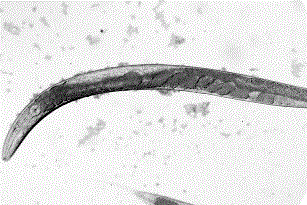C. elegans, a non-parasitic transparent roundworm is being studied by VCU School of Medicine researchers and may shed some light on factors that contribute to obesity. Images courtesy of Leon Avery, Ph.D./VCU.
(Medical Xpress)—As obesity rates continue to rise, experts are searching for answers in the clinic and at the lab bench to determine the types and amounts of food that people should eat.
Now, a transparent, bacteria-eating roundworm known as Caenorhabditis elegans – measuring approximately 1 mm in length – may provide researchers some insight into factors that contribute to obesity.
New findings reported by Virginia Commonwealth University School of Medicine researchers suggest that C. elegans has the ability to remember specific food – it feeds on bacteria – after it experiences it and consumes what is familiar more actively than food that is not. This same behavior also is observed in humans. The study was published Feb. 5 in the online journal eLIFE.
The VCU team found that preference for familiarity is mediated by a pair of serotonergic neurons in the nervous system of C. elegans. The team observed that the activity of the serotonergic neurons is suppressed selectively by taste and/or smell of novel food (bacteria).
"We have discovered how food experience, an acquired factor that significantly affects food consumption, regulates food consumption," said principal investigator Bo-Mi Song, Ph.D., a postdoctoral fellow in the Department of Physiology and Biophysics in the VCU School of Medicine.
"Because of the suppression, the serotonergic neurons are more active in response to familiar food than novel food, which in turn activates a humoral serotonin signal that increases the feeding response selectively in response to familiar food," she said.
Song has been working with Leon Avery, Ph.D., professor of physiology and biophysics in the VCU School of Medicine, who has conducted research on feeding and behavioral strategies in C. elegans for the past 29 years. Researchers consider C. elegans to be a useful organism in which to study molecular biological processes because of their simple anatomy. It was the first multicellular organism to have its genome fully sequenced.
According to Song, studies such as this may ultimately help address which food and how much food one should eat and may help individuals establish good eating habits, which in the long run will stop the epidemic of obesity and eating disorders.
Studies are underway to further explore and understand these findings.
Read the study online here: elife.elifesciences.org/content/2/e00329
Journal information: eLife
Provided by Virginia Commonwealth University



















